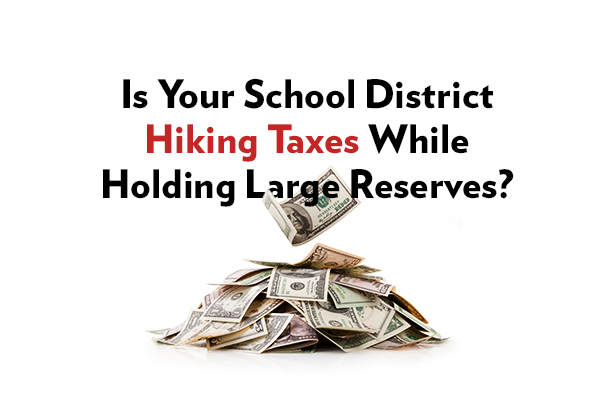Media

Growing Chorus Urges School Boards to Protect Taxpayers
In response to CF’s research on school district reserve funds, reporters and editorial boards have weighed in on the question: Why are districts holding millions in reserve while seeking higher taxes?
The Lancaster LNP editorial board, for example, described the surplus funds as “difficult to justify” given that taxes are rising in Lancaster districts:
Lancaster County school districts grew their general fund balances by nearly $75 million over five years while their tax rates climbed an average of 9 percent. The 17 public school districts that serve Lancaster County, including Octorara Area, had total general fund balances of $210 million in 2015-16, according to data from the Pennsylvania Department of Education. That was an increase of 55 percent from 2010-11, a five-year period in which nearly all school boards raised taxes.
If you’re reading this and doing the math in your head, trying to figure why your taxes keep going up while school districts are stashing money, at least there’s comfort in knowing you’re not alone.
…
Pennsylvania Auditor General Eugene DePasquale told LNP that an acceptable general fund balance is about 8 to 12 percent of a district’s annual expenditures. Anything above that — especially a balance exceeding 20 percent — should sound alarms, especially if the school board is approving a tax increase.
“When you’ve got that level of a surplus, before you’re looking for more money from the taxpayers, you should be dipping into those reserve funds first,” DePasquale said.
There’s also the transparency issue. As DePasquale pointed out, if you’re planning to raise taxes, “you should be fully disclosing to the taxpayers why.” We would add that school districts should also readily disclose how much they are holding in reserve.
Here’s what John Baer of the Philadelphia Daily News had to say:
Let’s talk about school districts across Pennsylvania holding reserve funds of your tax dollars in interest-bearing accounts.
State Department of Education data puts the total at the end of the 2015-16 fiscal year at $4.4 billion.
That’s with a “B.” And it’s an amount equal to 75 percent of the state budget for basic education this fiscal year.
…
Fine. Some reserves are OK, even necessary.
But every year, I’m told reserves are being spent and next year’s totals will go down. Yet they never do.
Baer also spoke with DePasquale, who disclosed that the Auditor General’s office will begin examining these reserve funds in future audits.
In the midstate area, Ben Allen of WITF reported that “Camp Hill in Cumberland County, Middletown in Dauphin County, and Lebanon in Lebanon County…are holding millions of dollars in reserve accounts. But in the last decade, they've also asked to raise taxes above the state's usual limit at least eight times.”
An editorial from the Bucks County Courier Times (Hoarding money, yet raising taxes) urges taxpayers to “Attend your next school board meeting and ask the folks you elected to manage your tax money wisely why they're raising your taxes even a little bit when they have a giant pile of money creating a sinkhole in the vault.”
Brian McCrone of NBC 10 Philadelphia explained how Lower Merion’s growing reserves could impact ongoing litigation about a potentially illegal tax increase:
Lower Merion School District isn't yet ready to give up the fight for about $4 million in new taxes that a judge has ruled it should return to taxpayers.
The affluent district lost an appeal before a panel of judges in Commonwealth Court, but it's asking the court to reconsider the ruling, the district's attorney for the case told NBC10 Friday.
At stake is a tax increase approved last year by the local school board, but then thrown out after a group of taxpayers successfully argued that Lower Merion had no business asking for more money when it already has more than $50 million in reserve accounts.
All along, it appears, those accounts got bigger. A conservative Pennsylvania think tank, the Commonwealth Foundation, found Lower Merion had $56 million in its “general fund balance” during the 2015-2016 school year, up about $100,000 from its 2014-2015 total.
Reports citing CF research also appeared in the Huntingdon Daily News, the Hazleton Standard Speaker, and the Lebanon Daily News.
School directors claim they have squirreled away millions in reserve in order to “save for a rainy day.” Of course, it's reasonable for districts to plan prudently and maintain a modest financial cushion. But with 220 districts sitting on reserves worth more than 20 percent of total spending, it appears many officials are planning for a monsoon, not a rainstorm.
Excessive reserves, combined with repeated tax increases, deserve public scrutiny. It's encouraging to see newspapers asking these questions. And it will be more encouraging to see school boards take a long look at their fund balance before raising taxes.